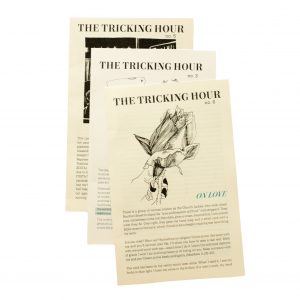
Beneath Everything
by The Clandestine Whores Network
published in Pinko #1
The Clandestine Whores Network is an expanded collective of sex workers against work, whores who draw power from a particular criminal tendency. To be clandestine; illicit, secret, hidden. Historically, a clandestine prostitute was one who refused to work within the confines of the law, or limited how her body was subjugated by it. Embracing the clandestine is to nurture resistance and more expansive forms of solidarity with people in the criminal underclass today.
This speculative essay could be seen as CWN’s lit debut. We respect their resolve to never wait to be told how we can live our fantasies, how we can hold our bodies in new ways. In this text we get a window into the world we are building as we organize for our autonomy. Take a look at the rest of Pinko #1 on their website.
Read
The Tricking Hour
by Saint Agatha/ Irene Silt
Tripwire Pamphlet Series #7
Gathering columns written over the last two years for a New Orleans local alt monthly, The Tricking Hour explores work, sex, criminalization, resistance, joy, solidarity and queer love in the alternative political economies of sex work. A fervently anti-capitalist missive through the intersectional lens of anti-work feminist praxis, where struggles for autonomy and survival are deeply embedded in gendered bodies clandestinely organizing new modes of political identity and rebellion. As Silt asks, “How do we use our bodies, each other, animals, objects in the world, without making claims of possession over them? How do we take our refusal so seriously that we do not return to business as usual—ever?”
FREEDOM AND PROSTITUTION
by Cassandra Troyan

Freedom & Prostitution moves through many landscapes, voices, characters, and motifs to explore entrenched connections between histories of gendered violence, and the struggles against it. Whether it is militaristic, imperialistic, or carceral in nature, the violence women face in sex work or their intimate relationships, are intrinsically linked by the force of capitalism and its capacity to shape and impoverish everyday life. Looking specifically at the case of Gary Ridgway, or the “Green River Killer” who murdered over 49 prostitutes during the 80s in the Pacific Northwest, and the response by sex workers, which influences and inspires the various moments of resistance embedded within the text.
Within this text, the notion of freedom means liberation and autonomy. The dream of a world without work, without money, without gender, while imagining forms of survival now for those who often have little to no choices, refuse to submit to the demands of tedious underpaid or unwaged labor, an abusive partner, or seek a life beyond work. Sex work is not a “better” type of labor, but a proposal for its abolition.
Rather than further marginalize sex workers by viewing their lives and deaths as either a site of titillation or disgust, Freedom & Prostitution looks at the freedom that sex work can allow, while addressing that the dangers sex workers face are not necessarily inherent to sex work, but to the violence of capital and the deeply ingrained misogyny and racism in the world today. The sex worker is not a person to be pitied, but another radical figure pursuing revolution through the collective movement of dissent as a means of re-constructing another history, and hopefully a future with freedom for us all.
Review by Rachel Rabbit White / Review by Marina Scott
Grin and Bare It All: Against Liberal Conceptions of Sex Work
By Luna Celeste
In this straightforward and clear essay, Luna Celeste conceptualizes sex work as a point where feminized labor (“women’s work”/caring labor) reproduces itself– that is, where a primarily-female workforce of social workers, scholars, writers, lecturers, professional sex work abolitionists, non-profits, “rescue” organizations, and bloggers exist to “serve” and “care for,” but ultimately control, another primarily-female workforce (sex workers). It also posits that sex workers directly or indirectly serve ruling class men through this performance of reproductive labor, which helps to stabilize the superstructure of heterosexual-monogamy, a dynamic which depends on the oppression of sex laborers as a class. Sex laborers are pulled into the cycle of stigma and criminalization that helps to maintain a perpetually marginalized, more easily-exploitable class. The essay takes the focus away from clients, and onto what is truly at stake in sex worker autonomy from the state and hetero-patriarchy.
We are informed by it’s thoughtful critiques on reformist politics and Celeste’s laying out of the triangulation of sex workers in a system of caring labor.
by Strangers in a Tangled Wilderness
Read / Print
Queens, Hookers, Hustlers
This text offers a history of the resistance of gender-variant misfits and rebels with a deeper look at the central role of hooker networks that united hustlers, queens, hair fairies, and radicals during the 1950s and ’60s, a pivotal era that led to the first gay riots that had the police fleeing the streets in San Francisco and New York.
Here we understand the legendary projects of Sylvia Rivera, Marsha P. Johnson, and the Street Transvestite Action Revolutionaries (opening houses for trans kids on the street, hustling for rent and for raising funds for the radical wing of Gay Liberation) as regular practices among the informal networks of queens and hustlers turning tricks and defending each other from violence in many urban areas across the United States. We extend gratitude to archival projects in the vein of this zine.
It is because of this legacy that we cry : solidarity means fight back!
Read / Print
PMS
Power Makes us Sick (PMS) is a creative research project focusing on autonomous health care practices and networks from a feminist perspective. We like their concept of “placeless solidarity” and the motivation to develop free tools of solidarity, resistance, and sabotage.
This zine features the pro-festo of the Prostitutes War Group, an internationalist collective of anarchist revolutionary queer insurrectionist prostitutes. We are inspired by their maximalism, their resolve as anti-workerists, and dedication to total destruction of the fascistic capitalistic Shitstem. We advocate for the same.
Read / Print
Against Stigma, Not Sex Work
By Irma VIP
BRI / The Underbelli is a Minneapolis-based project of mad, queer, and sex-working research. We like their effort to turn the harmful impressions left by things like trauma, policing, whiteness, settler colonialism and work into something constructive and helpful. We agree with their notion that “the more creative ways we find to survive, the more sensitivities that we cultivate, and the more that we allow for multiplicities of experience – the less that we will be bound by the toxicity and violent erasure of the everyday.” The texts and audio they put out is always unexpected, genuine, and resonate.
Keep this zine on Stigma in your back pocket. Hand it to people who
- believe in the logic of capitalism that wants us to choose to work when maybe we wouldn’t have to as much
- erase the agency of sex workers and
- offer nothing but useless and stigmatizing pity rather than material support that could improve the conditions of our lives and work
belliresearchinstitute.com
Read / Print
The Myths of Sex Trafficking: A Reader on Law Enforcement and Carceral Feminism
BRI / The Underbelli is a Minneapolis-based project of mad, queer, and sex-working research. We like their effort to turn the harmful impressions left by things like trauma, policing, whiteness, settler colonialism and work into something constructive and helpful. We agree with their notion that “the more creative ways we find to survive, the more sensitivities that we cultivate, and the more that we allow for multiplicities of experience – the less that we will be bound by the toxicity and violent erasure of the everyday.” The texts and audio they put out are always unexpected, genuine, and resonate.
We are tired of the cycles intensified deployment of law enforcement, “clean up” operations, and responses to purported increases in sex trafficking that come for us in the wake of spectacle. Moral panic and reformist policies around sex trafficking have been used to abuse, imprison and control sex workers, women of color, immigrants and so-called deviant women. This is a nice reader to prime anyone interested in preparing for something like the superbowl descending on your city, analysis to mix in with your own experiences of raids, undercovers, and rescue groups.
Rants and Rubs: Writings from Minneapolis Vol. 1
by Emma and BRI
BRI / The Underbelli is a Minneapolis-based project of mad, queer, and sex-working research. We like their effort to turn the harmful impressions left by things like trauma, policing, whiteness, settler colonialism and work into something constructive and helpful. We agree with their notion that “the more creative ways we find to survive, the more sensitivities that we cultivate, and the more that we allow for multiplicities of experience – the less that we will be bound by the toxicity and violent erasure of the everyday.” The texts and audio they put out are always unexpected, genuine, and resonate.
This 3 text pamphlet includes a take down of an anti-black and whorephobic Minneapolis newspaper (fuck it up!!), a poem, and some reflections on gentrification as process that excludes by militaristic mobilization and surveillance.
A Theory In Tears
by Cassandra Troyan
Cassandra Troyan is a writer, organizer, and pétroleuse whose work uses a Marxist-feminist lens to demarcate space for interventions in the spheres of theory, politics, and culture.
This chapbook complicates the reader’s relationship to narrative truth claims proffered by the institutional sites complicit in delivering “justice,” such as the courtroom or the prison. Focusing on issues of gendered violence, rape, and sexual assault, it seeks to discover different forms for addressing harm while releasing those who are named by it. Their writing always makes us cry, feel full, less afraid but definitely more feared.
Buy / Read
Field guide to living w/ the earth
A pamphlet on finding wilderness everywhere, and then using it to fight the police.
Print
20 Years of Failing Sex Workers
Thoroughly researched by those who have suffered from the Nordic Model the most, Swedish sex worker comrades reveal the violent and sobering truths of this supposedly “feminist” model. Compiled in response to the twenty-year anniversary of the “Swedish Sex Purchase Act” (1999), this is a crucial work to share with anyone who wants to speak to you about the supposed ills of prostitution without mentioning the violence of the state meted against those trying to survive.
Read
<3 of a Heartless World
By Maya Andrea Gonzalez and Cassandra Troyan
“How is the Girlfriend Experience defined? What is the job in of itself, what is being performed? How then does a prostitute differ from a sugar baby providing the GFE? Who is a prostitute or who is being targeted or marked by that term? What we hope to demonstrate, is the necessity for anyone theorizing girlfriend experience to consider the ways in which these types of empathic affects are deeply embroiled in the institutions of love, marriage, and family, extending psychically into the unwaged emotional lives of both the sex worker and the client–beyond the parameters of a given paid encounter. In this way, the boundaries between work on and off-the-clock, bleed into one another, securing the ongoing reproduction of the relationship. At the same time that a sugar baby is providing reproductive work for her Daddy, which is to say, she is also reproducing herself outside of the market, that is, in the economy of libidinal organization indirectly mediated by the market, in which she must prepare her labor-power for future service. Viewing this affective labor as a mode of social reproduction, we aim to historicize the girlfriend experience in relation to the demand for authenticity, singularity, and emotional labor inherent to service economies, as being an integral part of neoliberal capitalism’s commodification of naturalized enjoyment and its corresponding extension of the working-day.”
This texts shows us what is possible when sex workers theorize their own lives rather than waiting for, or allowing academics to speak for us. As new forms of sex work develop, how can we cultivate the necessary tools to imagine horizons of resistance and place within it? “To assert payment for that which is assumed to be free is to say that her body belongs to no one but herself — or to nobody but herself and the body of struggle.
Prorate Confidant: Beyond Despoiled Innocence and Empowerment
By: Angustia Celeste (Angustia[at]riseup.net)
Angustia’s essay on vulnerability, prison, consent, heteromonogamy and anarchists is the perfect sister piece to Luna Celeste’s “Grin and Bare it all”; as the two were published together in a 2015 issue of the quarterly magazine
Rolling Thunder. She is nuanced and uncompromisingly anarchist when reminding us that all our relationships, even those between a john and whore, offer potential toward social rupture. On the contrary, she argues, essentialist arguments for or against “empowerment” are beside the point interpersonally, and in social war.
The Racism of Decriminalization
By: Nada Zenith DeCat
Calling in from New Zealand, full stop commentary and criticism shared in this essay should be a must-read for all white hookers engaging in decriminalization activism. How much do you really know about the decriminalization movement and the organizations negotiating on our behalf? Sad realities woven through the legacy of sex work activism are that it has too much in common with every other feminist tradition we have inherited: white supremacy. “Under the leadership of Catherine Healy, The Prostitutes Collective accepted criminalizing migrant workers as a condition of partial decriminalization of sex work in New Zealand.” Here we learn there is a big difference between sex worker-sympathetic legislation and actual, full decriminalization. That difference being, WHO is benefiting from half-hearted decriminalization legislation?
The Belly of the World: A Note on Black Women’s Labors
By: Saidiya Hartman
In this text Hartman articulates a Black abolitionist-feminist analysis of chattel and racial slavery’s implications on the lives of Black women, reproductive labor, and the category of the proletariat worker. She traces the history of Black women’s reproductive labor and modes of resistance under slavery to argue that “The agency of the slaves becomes legible as politics, rather than as crime or destruction, at the moment slaves are transformed into black workers and revolutionary masses fashioned along the lines of the insurgent proletariat.” The grammars of the worker and the general strike cannot provide a narrative that encapsulates forms of care, intimacy, and kinship enacted as survival for black women. She demonstrates how a politics figured outside the category of the worker has only ever shown up as “monstrous” and criminal.
We turn to this text reveal how a path toward decriminalization propped up on the glorification of the category of the worker risks maintaining and consolidating anti-Black conceptions of cis-womanhood under racial capitalism. We understand how our refusal of innocence and affirmation of criminality is indebted to this legacy of Black feminist analysis of work and practices of resistance.
Read
A Disgrace Reserved for Prostitutes: Complicity & the Beloved Community
By: Pluma Sumaq
This text brings forward a critique of liberal and white feminist perspectives on sex work and prostitution through the intersections of race, class, and gender deviance. Sumaq reflects on the material and psychic consequences stigma has for women of color, poor women, or trans women doing sex work. She writes “to create a language around and an image of a “Sex Worker” that is normalized and free of stigma did not seem very revolutionary to me. To me it said, “accept us because we are just like you.” Well, what if we’re not like you? What then will you do to us?”
Street Transvestite Action Revolution: Survival, Revolt, and Queer Antagonist Struggle
Interviews, conversations and statements from Sylvia Rivera and Marsha P. Johnson on STAR (the Street Transvestite Action Revolutionaries), the Stonewall Riots, and informal networks of trans and queer survival and liberation in the 60s and 70s. We are grateful for the the archival work Tourmaline has done to make Marsha P. Johnson’s history and writings more widely accessible. (See Tourmaline’s film “Happy Birthday, Marsha!”
here)
Additional Suggested Reading
Why You Shouldn’t Study Sex Workers
by Lime Jello
Read
Understanding the Complexities of Sex Trade/Work and Trafficking
by Emi Koyama
Buy
Cash/Consent
by Lorelei Lee
Read
Reassessing Foucault: Modern Sexuality and the Transition to Capitalism
by Christopher Chitty
Read



